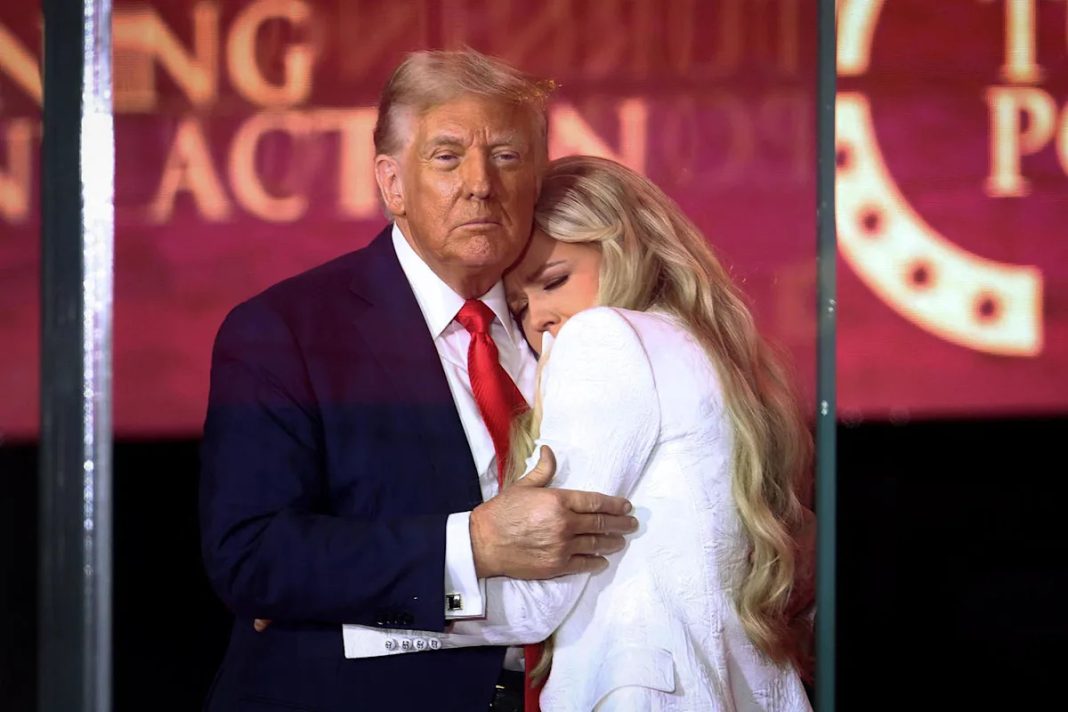When President Donald Trump addressed the tens of thousands of people at the State Farm Stadium in Glendale, Arizona, gathered on Sunday to commemorate Charlie Kirk, who was shot dead Sept. 10 while speaking at Utah Valley University, he described the 31-year-old founder of Turning Point USA as “a missionary with a noble spirit and a great, great purpose. He didn’t hate his opponents.”
But then, demonstrating that he can’t even allow the deceased to be the focus at his own memorial service, Trump interjected: “That’s where I disagreed with Charlie. I hate my opponent, and I don’t want the best for them. I’m sorry. I am sorry, Erika,” he said looking toward Kirk’s widow, who at that same service said that she had forgiven her husband’s killer.
“But now Erika can talk to me,” Trump said after soaking up the laughter of the crowd, “and the whole group, and maybe they can convince me that that’s not right.” That may have been the absolute worst way to channel Charlie Kirk’s “Prove me wrong” challenges.
The Christian implications of Trump’s statement are damning, to say the least. Despite professing Christianity, Trump rejects a direct command from Jesus himself to love one’s enemies, and doesn’t appear to feel any shame or embarrassment at admitting it.
If the words of Jesus can’t convince a self-professed nondenominational Christian (who said, “It was God that saved me” from being assassinated in July) that expressing hate for one’s opponents isn’t right, then why would Erika Kirk, or anybody else, bother?
Nobody should be shocked by what Trump said. There’s nothing new about Trump saying something that gives the public reason to question the sincerity of his beliefs. In 2015, he could neither cite a favorite Bible verse nor admit that he needed forgiveness. Because, as he put it, “Why do I have to repent or ask for forgiveness if I am not making mistakes?”
Then there was the “Two Corinthians” thing. While there are some Christians and biblical scholars who do say “Two” and not “Second” Corinthians to refer to that epistle of Paul’s, Trump’s verbalization of “Two Corinthians” at a speech at Liberty University in 2016 was another moment that suggested a profound unfamiliarity with the Bible. After all that, in 2020, Trump held up a Bible in Washington’s Lafayette Square just after he’d had people protesting George Floyd’s murder cleared out. He seems to see the Bible as a political weapon and not as a religious text that should inform, among other things, how he talks about and treats his adversaries. Or he sees it as a moneymaker. He began selling $60 Trump Bibles last year.
But even though I am a Christian, my main concern isn’t that Trump’s remark about hating his opponents is a bold and unrepentant defiance of a command directly out of the mouth of Jesus, but that it is an equally bold declaration that he doesn’t think of himself as the president for all Americans. Every president of the United States has opponents, but have we ever heard a president declare his hatred for them?
To the contrary, we’ve come to expect people who’ve been elected to run the country to commit to being everybody’s president. George W. Bush made that commitment when he gave his victory speech in 2000: “Whether you voted for me or not, I will do my best to serve your interests and I will work to earn your respect.” Barack Obama said, “And, to those Americans whose support I have yet to earn, I may not have won your vote, but I hear your voices, I need your help, and I will be your president, too.” Joe Biden said, “I will work as hard for those who didn’t vote for me — as those who did.” Even Trump, in 2016, said, “I pledge to every citizen of our land that I will be president for all Americans.”
Now, in case we hadn’t already figured it out, Trump wants us to know that he’s only president for some Americans. That’s the only conclusion we can draw — unless we accept the absurd idea that Trump expects to faithfully serve Americans he hates.
Obviously, Trump’s partiality toward his supporters was already clear. The most recent, glaring example, came after Kirk was killed. Trump had flags lowered for Kirk, and Air Force Two flew Kirk’s body from Utah to Arizona, but Trump didn’t so much as call Minnesota Gov. Tim Walz in June after Minnesota House Speaker Emerita Melissa Hortman and her husband, Mark, were fatally shot, and Minnesota state Sen. John Hoffman and his wife, Yvette, were injured.
“Why would I call him?” Trump said of Walz before dismissing the idea as a waste of time. A spokesperson for Walz said then that the governor “wishes that President Trump would be a President for all Americans.”
Whether it’s deciding that some American victims of political violence are more deserving of compassion than others, or even demanding that the attorney general drum up charges against his opponents, every day we get more evidence that Trump isn’t the president for all Americans.
And on Sunday, we heard it directly from him that he doesn’t intend to be.
This article was originally published on MSNBC.com

